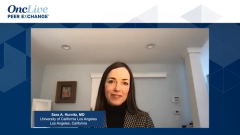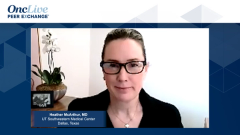
How Clinical Trials Inform Treatment Selection in Early-Stage HR+ Breast Cancer
A brief review of prevalent clinical trials in the early-stage HR+ breast cancer paradigm and how they help to inform treatment decision-making.
Episodes in this series

Transcript:
Aditya Bardia, MD, MPH: One final point related to early breast cancer before we move on to metastatic, and it relates to Oncotype DX. We saw updated data from the TAILORx and RxPONDER trials. Virginia can you review what was presented at SABCS [San Antonio Breast Cancer Symposium] related to RxPONDER and TAILORx?
Virginia Kaklamani, MD: With TAILORx, we have 12 years of follow-up and event rates, which is absolutely amazing. More than 10,000 women were included in the trial, and some of the women with a [recurrence] score of 11 to 25 were randomized [to receive hormone therapy with adjuvant chemotherapy vs hormone therapy alone]. It’s interesting that those women, especially with the 11 to 25 recurrence rate, had pretty good outcomes. The distant risk of recurrence was 7% in this patient population. Some of the analyses are more mature and a little easier to interpret. What caught my eye was looking at patients in that 11-to-25 risk group and figuring out who would benefit from chemotherapy and who didn’t. Even though the whole population didn’t seem to benefit from chemotherapy, younger patients did and older patients didn’t. It’s interesting that women from ages 41 to 50, if they were premenopausal, did have a benefit with the addition of chemotherapy—especially patients with a score of 21 to 25, where that absolute benefit was 7.8%.
In the 16-to-20 risk group, the absolute benefit of chemotherapy was small. But in that 21-to-25 risk group, we clinicians should discuss chemotherapy with them a little more because they may get a benefit. Interestingly, women 40 years or younger did not have benefit from chemotherapy. That starts the discussion: is chemotherapy the avenue to achieve ovarian suppression for these women, or is there an additive effect of chemotherapy that’s not captured only in ovarian suppression? Obviously, we can’t answer that question. There’s an NRG [Oncology] trial that will hopefully answer this question in the next several years.
The RxPONDER trial was similar to TAILORx, but in the 1-to-3 node-positive patients. Here, the presentation mostly targeted race and ethnicity. What caught my eye was that Black women had worse outcomes compared with non-Hispanic White women with similar Oncotype scores. When you look at that, you’re thinking, “Why is this the case?” First, it’s seems they were offered different chemotherapy. The Black women were less likely to be offered an anthracycline and were more likely to be offered a cyclophosphamide-taxane chemotherapy. Did that make a difference? Who knows.
Compliance is our next question. Maybe they were assigned chemotherapy and didn’t have it, or maybe they were given endocrine therapy and weren’t compliant with it. That wasn’t the case. They were more likely to accept the assigned group that they were given, and they had at least as good compliance endocrine therapy as non-Hispanic white women. Which raises the question: why are Black women with HR [hormone receptor]–positive early stage breast cancer having worse outcomes compared with White women? Those outcomes were not much worse, but you’re looking at an invasive disease-free survival of 87.2% vs 91.5% and a distant relapse-free survival of 90% vs almost 95%. Those are interesting data. Obviously, we’re going to have to look at the biology of the disease a lot more.
Heather McArthur, MD: It also raises the question: do we need different cutoffs for these assays that are more refined based on race? It was disappointing to see that only 6% of patients in RxPONDER were Black, 8% were Asian, and 70% were non-Hispanic White. We have a lot of work to do in ensuring diversity in enrollment on clinical trials.
Aditya Bardia, MD, MPH: That’s a great point. We were recently having a discussion related to pharmacogenomics, and it’s a similar point. Some of these studies are done in a certain ethnic subgroup, and the cutoffs might not be applicable to other groups.
S. Michelle Shiller, DO, AP/CP, MGP: It’s important to highlight that all genetic data—all of it across the board, independent of looking for cancer biomarkers, hereditary predisposition, or pharmacogenomics— have a significant overrepresentation in Caucasian individuals. Whether that explains variability in response…I wonder, especially looking at and listening to some of the discussion on the RxPONDER data with respect to Black women if something pharmacogenomic is driving some of that. Nonetheless, there’s a significant underrepresentation of any other ethnic group. We have so much more to learn, and I hope this is something we can change so that we can better help each patient individually. That would put us in a different level of precision oncology. That’s why at Baylor [Scott & White Health]—I know it rubs some the wrong way when they hear this term, but I’m using it for the purposes of discussion—we have a lot of reflex-based testing, pathologist-driven reflex testing. I want to define and qualify that. It’s not that a pathologist decides to just start doing the testing. The testing and algorithm are established in a multidisciplinary discussion with our clinical colleagues. But we have that diagnosis first, so we initiate the testing. That’s a great way to overcome barriers of ability to pay or ethnic origin. There are shortcomings to that approach. I fully acknowledge that. But with respect to knowing that we have a lack of data across ethnic subtypes, it’s 1 of the effective ways to overcome that.
Aditya Bardia, MD, MPH: Absolutely. I imagine that’s captured in a database as well. We might not be able to do randomized trials for every question, subgroup, race, or ethnicity. But these registry-based studies and databases are very important as well.
Transcript edited for clarity.












































